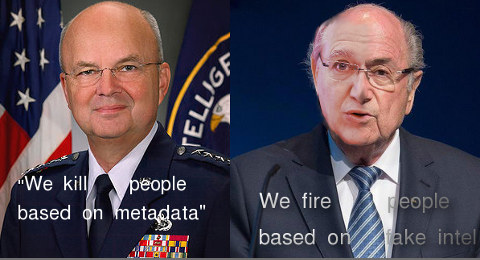

Utter disregard for the law a privilege of few
Double jeopardy is a procedural defence that forbids a defendant from being tried again on the same (or similar) charges in the same case following a legitimate acquittal or conviction. In common law countries, a defendant may enter a peremptory plea of autrefois acquité or autrefois convict (autrefois means "in the past" in French), meaning the defendant has been acquitted or convicted of the same offence and hence that they cannot be retried under the principle of double jeopardy that is mirrored by the “non bis in idem” principle applied by the ATILO in respect of disciplinary cases.
Third time lucky?
Towards the end of 2014, the Investigative Unit carried out covert surveillance operations on a computer on the first floor of the Isar building as reported in the press and Internet blogs some time later. This computer is public: it was used by visiting delegates and patent attorneys. Subsequently a member of the Boards of Appeal was accused of “anonymous defamation1” of Mr. Topić (VP4) and served a “house ban” (technically equivalent to a suspension). The result was a storm of protest2 and quite rightly so. The Office does not have the right to spy on computers used by Council delegates and third parties. Investigating DG3 members further infringes their independence. For the same reason (infringement of their independence) Mr. Battistelli does not have the authority to suspend DG3 members. The latter aspect was more or less covered-up by the Council retroactively (sic) approving of the action. The alleged victim of defamation, Mr. Topić, appears to have a significant number of cases slowly working their way through the Croatian legal system. Interestingly, Mr. Topić lost his defamation complaint against a former co-worker despite the very serious nature of the accusations that she raised against him3. Hence it is difficult to determine what exactly can be considered “defamatory” in relation to Mr. Topić. The Office, on the other hand, apparently did not hesitate to facilitate the circulation of numerous very dubious accusations against the DG3 member, leaving the impression that a Board of Appeal member with an impeccable resume was in fact an armed nazi stalking the corridors of the Isar building4.
Mr. Battistelli is clearly determined to have the DG3 member removed from office, but seems to be rather lost as to the procedures to follow. The first attempt was via a Disciplinary Committee set up by the Council, to be followed by a dismissal by the Council in October 2015. In making this proposal Mr. Battistelli overlooked Art. 23 (1) EPC which stipulates that members of the Boards can only be dismissed upon a proposal from the Enlarged Board of Appeal. In other words: the President of the EPO proposed to the Council to act in breach of the EPC. The Council apparently had its doubts about the legality of the course of action proposed by the President and commissioned an independent legal opinion which confirmed their suspicions: a Board member cannot be removed from office unless the Enlarged Board of Appeal (EBoA) has decided to make a proposal to that effect.
A first attempt to get the EBoA to issue a proposal for removal from office had already been initiated earlier in 2015 but had failed because the EBoA apparently could not make sense of the mass of unstructured material that had been thrown at them. It found the request submitted by the Council to be irreceivable due to lack of substantiation. Apparently, the Office management suppressed the publication on the Office website within days despite the decision of the EBoA that it should be published. This obviously is another problem since it amounts to Mr. Battistelli censoring the EBoA, which seems to be a further interference with its independence. Not awaiting the written reasons for the first decision, the Council, apparently at the urging of the President, proceeded to launch a second request for removal from office. This second request suffered from the same flaws and was withdrawn by the Council on 11 February after a delay of several months. The decision in the second request, although flagged for publication by the EBoA, never made it to the outside world but can be found on the Internet5.
The Council then launched a third request which is still pending. In order to accommodate the prolongation of the procedure, Art. 95 SevRegs was changed in December 2015 with retroactive effect (!) so that now not only the Board member concerned, but any Board member can be suspended for 2 years and longer. After 1.5 years suspension, now on half pay, and 5 procedures (investigation, disciplinary procedure and 3 EBoA procedures), one wonders how many times the Council may come back with basically the same case.
Detailing the complete catalogue of procedural errors in this case would go far beyond the scope of [this] article. Suffice it to say that the whole procedure provides a textbook example for the lack of competence that prevails in the Battistelli administration. And whatever the outcome will be, it is clear that there will only be losers: the Council, who did not assume responsibility as appointing and disciplinary authority, Mr. Battistelli who, in this procedure, has breached almost every regulation in the book; DG3 that has seen its independence seriously undermined, and the DG3 member concerned who has been living an uncertain and very expensive nightmare for 18 months, with no end in sight.
______ 1Communiqué No. 64 (€« Anonymous defamation : EPO staff member apparently involved €») of 03.12.2014, referring back to a Communiqué of 26.02.2013 (€« Defamation Campaign against VP4 €») 2 http://ipkitten.blogspot.de/2014/12/breaking-news-enlarged-board-appeals.html 3 http://techrights.org/2016/01/19/croatian-defamation-lawsuit-an-update/ (access to Techrights is censored in the EPO) 4 Similar accusations were repeated by the President in a letter to Mr. Pierre-Yves Le Borgn' 5 A short overview of the case and links to both decisions can be found on wikipedia: https://en.wikipedia.org/wiki/Art_23_1/15_and_Art_23_2/15